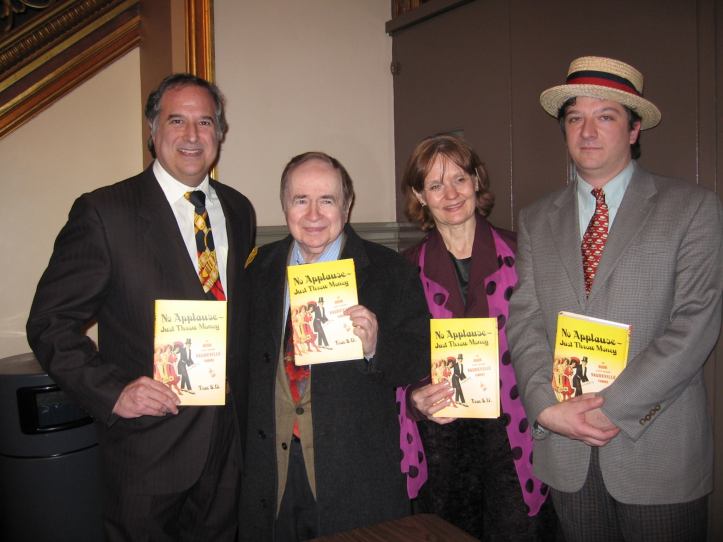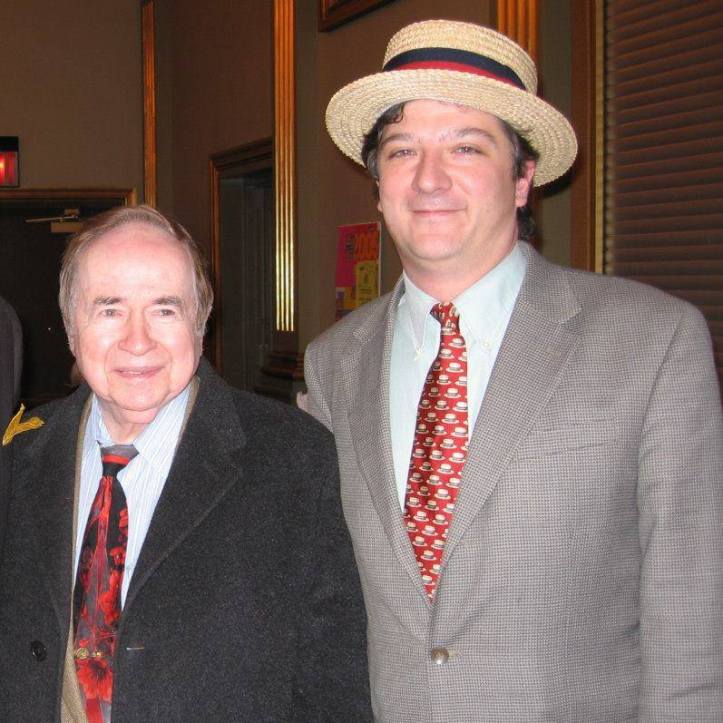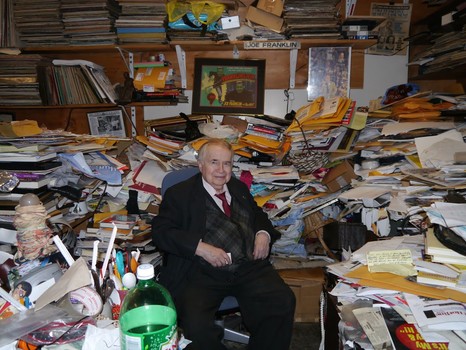Written on the occasion of Joe Franklin’s passing, January 2015.
By now the world has heard the news, but I was at the theatre last night and at rehearsal this morning so this is the first moment I’ve had to blog about the fact that the great Joe Franklin (b. 1926) has gone on to show biz heaven.
I had the honor of knowing Mr. Franklin and had dealings of one sort or another with him about a dozen times. Yet, though he was famous, it was fairly impossible to feel special about knowing him, and you know why. EVERYONE had met him, knew him, talked to him or even got to go on his show at one time or another. He was that democratic and that accessible. After I first met him, I thought I was pretty cool. And then it rapidly emerged that EVERYONE ELSE had already done that. “Wait a minute? YOU met Joe Franklin? YOU sat in his office?” At least it seemed that way.
Like most people who aren’t from New York, I initially learned about him through Billy Crystal’s sketches on Saturday Night Live. Those sketches were stupid, because Franklin was strictly a household word only in NYC. Everyone else was like, “What the hell?” But here in New York, he was an institution for something like 60 years.
Joe was the soul of generosity. When it came time to research my book No Applause I of course went to sit at the feet of the Nostalgia King. We initially met at his establishment Joe Franklin’s Memory Lane, located in the Broadway district, in around 2002 or 2003. Franklin had gotten his start writing for Eddie Cantor’s radio program, so we talked quite a lot about Cantor. This blew my mind — this man knew, this man worked with EDDIE CANTOR! “Good morning, Mr. Cantor!” Can you imagine? Because of this I always thought of Joe as much older than he really was. Granted 85 y.o. is pretty old, but the Cantor connection made me think of Franklin as being about 125. Naturally, however, Franklin was probably in his early 20s working for the 50ish Cantor in the waning days of radio. Anyway, I remember Joe being sort of reticent when I spoke about Cantor’s character as being a “pansy” or a “nance.” “No, no,” Joe said, “he was very masculine, very masculine.” Like, who cares? Anyway, we spoke about some of the (now) more obscure characters like George Jessel, Lou Holtz and Benny Rubin, as I recall. And he always liked to try to trip me up with with “Was Al Jolson ever in vaudeville? Yes, or no?” Joe always seemed to think the answer was no, although Jolson in fact had been. But I reckon Joe ultimately trumps my glib knowledge by actually having MET Jolson.

Franklin ended up knowing a lot of these figures because in the 1940s he almost single-handedly invented “nostalgia” on his local NYC radio program. Yes, Billy Rose had opened a nostalgia nightclub in the late ’30s, but Franklin was the one who identified it as a new market niche for the MEDIA. And this was early. We younger generations lump things together nowadays that were quite separate back then. In other words, the popular trends when Joe was starting out were things like big band music, swing, be bop, night clubs, network radio, and Hollywood studio films (film noir, westerns etc). But stuff like vaudeville, silent movies, baggy pants comedy, ragtime, early jazz and so forth were ALREADY considered old hat and old fashioned by that time. Joe loved that stuff anyway and so he plugged it aggressively! (BTW, quick shout out to Cezar Del Valle who recently showed me a photo of a nostalgia cinema which Franklin operated at Coney Island back in the 40s).
Then when television hit, Franklin was also a pioneer of the talk show. Having been a radio d.j. and then a t.v. talk show host, were the reason why when you went to Joe Franklin’s office it was piled to the ceiling with books, record albums, 8 x 10 glossies, movie posters — whatever promotional crap ever came his way. He was a hoarder, and that’s no exaggeration.

But like I said, he was generous and so I subsequently dealt with him many times over the years. He helped me promote No Applause when it came out, he came and spoke at a half dozen different events I helped organize for the Theatre Museum and Theater for the New City. When I was P.R. director for New-York Historical Society , the curators tried to acquire his crazy collections as a bequest, but he was really cagey about it, wanting to get it cataloged, but never signing on the dotted line when it came to a gift. By the way, though he was accessible, getting ahold of him was hilarious. He had two old fashioned black dial phones in his office. He would work both phones as though they were different lines. Your call would often get interrupted by him picking up the other phone and you would hear the whole conversation with the other person.
Now here’s the thing. I JUST DID A RADIO SHOW WITH HIM WEDNESDAY! This may well have been his last radio show. The subject was one he knew well, because he actually knew her: Sophie Tucker. And he did not sound well, although you can still hear all his old familiar laugh-lines. Who knows whether his preposterous sounding claims were true? (First he says he’s interviewed 100,00 people. Then he bumps it up to “half a million”). So he rounded up! Close enough…
Here’s the show we did just four days ago: http://www.hallicasser-jayne.com/sophie-tucker-what-becomes-a-legend/
Now that Joe is dead, another old laugh-line has come true. For now it can truly be said that NOSTALGIA ISN’T WHAT IT USED TO BE.



I first knew of Joe Franklin through his “Classics of the Silent Screen,” a book that was my first real introduction to silent films. Given to me as a present when I was a kid, the book had an enormous impact: I made it a mission to see as many as I could of the films and stars talked about (not as easy to do in the late ’60s as it is now). Thank you, Joe.
LikeLike